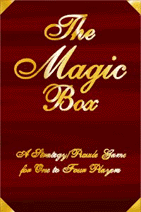by Demian Katz
 The Magic Box
The Magic Box
Published by Stupendous Games
Designed by Stuart John Bernard
Illustrated by Bryce Somerville
72 tiles plus two rules sheets (solitaire and multiplayer variants) and 11"x17" playmat
1-4 players
$10.00 (print), $5.00 (PDF download)
I'm probably not the only gamer to think back to my childhood and
wistfully remember how frequently my biggest problem was that I had more
time than I knew what to do with. If only that were my problem today, I
would write reviews with considerably greater regularity. In any case,
I bring this up not out of a random nostalgic urge, but because The
Magic Box reminded me of my early fondness for solitaire games and
struck me as just the sort of game I would have used to while away an
otherwise tedious afternoon or two.
Opening the Box
Consisting of square tiles featuring numbered arrows in a variety of
colors, The Magic Box is really more puzzle than game, feeling rather
like an advanced version of Hi-Q, the classic solitaire peg-jumping
game. To play, you shuffle the tiles (being sure to rotate them in the
process so that the arrows point in all different directions), then deal
them out in a square grid. A tile can be moved a number of spaces equal
to its numeric value in the directions that its arrow points. The board
wraps around, so tiles that move off the top come back on the bottom and
tiles that leave from the right return on the left. The object of the
game is to match tiles by color and/or number. If you land a tile on
another that matches by both color and number, you remove the matching
tiles from the playing field and earn a "free spin" or "free slide" tile
which can be spent to rotate or move tiles regardless of matching (you
also start the game with one of each of these special tiles). If you
land on a tile that matches only by color or by number, but not both,
you remove the tile that you moved, rotate the tile that you landed on,
and, if it's legal, move that tile. There is the potential for quite
lengthy chain reactions if enough planning is done. The object of the
game, not surprisingly, is to eliminate as many tiles as possible.
Many solitaire games of this sort have spawned multi-player variants,
but these variants are generally dull and lacking in player interaction.
If memory serves, the two-player Hi-Q, for example, simply had the
competitors simultaneously playing the solitaire game and hoping to
finish first. Fortunately, The Magic Box does a better job of
supporting multiple participants. Players take turns making moves, but
they keep all of the tiles that they remove from play. When no moves
remain, everyone adds up the numeric values of their tiles to see who
has the highest score. When people are competing, complex chain
reactions are more significant to scoring, and it sometimes becomes
necessary to choose between scoring points for yourself and preventing
the next player from scoring even higher. It's still more puzzle than
game, but it scales better than most.
"Box Contents May Settle"
The Magic Box has two main flaws, one more significant than the
other. First of all, the game's theme is very weak. Supposedly, this
all has something to do with a wizard trapped in a magical device, but
apart from some brief text at the start of the rules, the game is
completely abstract. There's nothing wrong with an abstract game, but
less generic graphics or more thematically appropriate names for the
"free spin" and "free slide" tiles might have given the game more of the
fantasy tone it seems to aspire to.
A more serious problem is the game's low-budget production. Obviously,
the PDF version is limited by the owner's computer equipment, but even
the pre-printed version was clearly created using standard
pre-perforated cardstock and somebody's inkjet printer (as evidenced by
the smudges on my fingers after I finished tearing the tiles apart).
Colors are somewhat dull, and the tiles are so light that play is
frustrating - they slide (or worse, blow) around far too easily. I
realize that thicker cardboard or better print quality is too much to
ask of a small company, especially at this price point, but this doesn't
change the fact that this is a very tactile game, and it would be more
fun if it felt nicer to play. If you have the facilities and patience
to build yourself a better set, I would actually recommend the download
over the printed version.
Conclusions
I don't expect to spend much time with The Magic Box; my patience
for solitaire puzzles is not what it used to be, and there are other
group games I would rather spend my time on when I have a captive
audience. Still, it's not a bad design, and the price is right,
especially for the PDF version. If this sounds like your kind of game,
you have little to lose by grabbing a copy. If nothing else, perhaps
you'll relive a little piece of your childhood.


 The Magic Box
The Magic Box